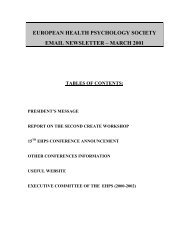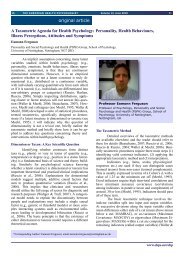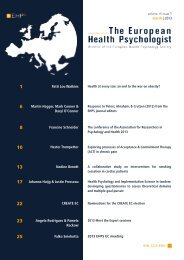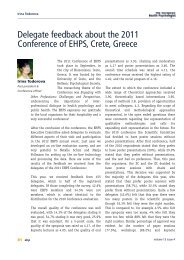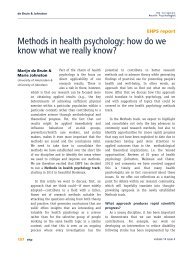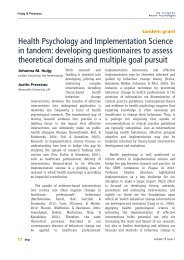PDF download entire issue - European Health Psychology Society
PDF download entire issue - European Health Psychology Society
PDF download entire issue - European Health Psychology Society
You also want an ePaper? Increase the reach of your titles
YUMPU automatically turns print PDFs into web optimized ePapers that Google loves.
Banozic<br />
create report<br />
Visiting scholar grant report: A research<br />
project on chronic pain and social exclusion<br />
Report on the research visit at Katholieke Universiteit Leuven, Faculty of <strong>Psychology</strong> and<br />
Educational Sciencs, 4 – 16 April 2011<br />
Adriana Banozic<br />
University of Split<br />
Chronic pain is difficult both<br />
for patients to tolerate and<br />
for various health<br />
professionals to treat<br />
effectively. Management of chronic pain<br />
population still faces many challenges and<br />
requires novel approaches in the treatment of<br />
pain. The Pain Clinic of University Hospital Split<br />
and the Laboratory for Pain Research University<br />
of Split were particularly interested to further<br />
explore social contextual factors that contribute<br />
and sometimes maintain chronic pain conditions.<br />
Therefore this research visit was particularly<br />
oriented towards a collaborative project that<br />
aims at exploring contributing effects of social<br />
exclusion on pain perception.Chronic pain<br />
patients often face problems with everyday<br />
functioning and social interactions to more<br />
executive functions such as working memory,<br />
decision-making and emotional processes.<br />
Prof Jessie Dezutter & Adriana Banozic<br />
Further on, the perceived lack of understanding<br />
or social support can sometimes lead to the feeling<br />
of stigmatization in chronic pain patients,<br />
which in addition impacts both their disease<br />
severity and their social relationships. Due to<br />
these factors chronic pain patients are potentially<br />
more likely to experience social exclusion,<br />
which increases with the level of their disability.<br />
This particularly has repercussions for chronic<br />
pain patients who are experiencing social<br />
exclusion processes due to the conflict with<br />
closer social surroundings as well as<br />
professionals involved in their treatment. The<br />
results of several studies suggest that chronic<br />
pain may alter pain perception. There is also a<br />
reason to believe that the pain of social<br />
exclusion shares some of the same neural and<br />
psychological mechanisms as the experiences of<br />
physical pain. These shared mechanisms include<br />
the anterior cingulate cortex, periaqueductal<br />
gray matter, brain structures and the opioid<br />
systems. However, consistent findings on how<br />
social support in chronic pain patients can<br />
influence pain perception and empathy are<br />
lacking. This study would provide more<br />
information how to provide adequate support for<br />
individuals with chronic pain affected by social<br />
exclusion processes. This research visit embraced<br />
the overall developmental strategy of the Pain<br />
Clinic University Hospital Split, which prioritizes<br />
interdisciplinary research in chronic pain. The<br />
research visit to the Faculty of <strong>Psychology</strong> at<br />
Katholieke Universiteit Lueven was concentrated<br />
on gaining knowledge and methodology of<br />
87 ehp volume 13 <strong>issue</strong> 4



